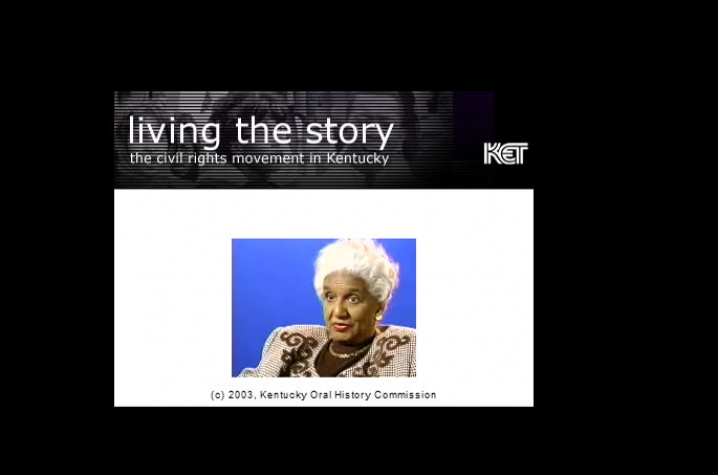Sisters on the Front Lines of the Struggle

LEXINGTON, Ky. (Oct. 12, 2010) − Former NAACP President Audrey Grevious remembers tearing out the pages of her school books.
The future teacher loved school and her professors, but with offensive racial epithets lining the pages of the used texts, she and her classmates refused to look at the filth.
"We would get the old books from the white schools, and many, many times they had the most derogatory remarks written in them," she said in a 1998 Kentucky Oral History Project interview. "But our teachers told us to look beyond that. This is what we grew up with."
The University of Kentucky and Lexington community will have the chance to hear Grevious's story at the African American Studies and Research Program's second "Fall 2010 Dialogues in Race Film Series: Sisters in the Struggle," from 4:30-6 p.m. on Thursday, Oct. 14, in the Martin Luther King Cultural Center, located in Room 133 of UK's Student Center.
Grevious was born in Lexington, Ky., in 1930 and still resides in the area. After graduating, the social activist first taught at, and later became principal of Kentucky Village, a state reformatory for delinquent boys. Following the closing of the school, she taught in Fayette County Public Schools, where she remained until retirement
Grevious became active with the National Association for the Advancement of Colored People (NAACP) in the late 1940s, serving as president of the Lexington chapter in the 1960s.
As the civil rights movement heated up, and Grevious rose to become the president of the Lexington chapter of the NAACP, her friend and vice president Julia Lewis became the president of the Congress of Racial Equality (CORE).
The two brought the two organizations together, organizing protests, pickets and sit-ins, and successfully and peacefully achieved their objectives. This was the first time that the NAACP and CORE had worked together, as ideological differences at the national level had previously kept the groups apart.
Kentucky women experienced the Civil Rights Movement differently, and AASRP chose to focus on the role of gender and race in this particular era of Kentucky history, according to AASRP Director Sonja Feist-Price.
"We'll be talking about what it must have been like to be part of the civil rights movement in Kentucky, as well as what these issues mean to us today," said Feist-Price.
As part of the Civil Rights in Kentucky Oral History Project, the Commission, a division of the Kentucky Historical Society, began the oral history project in 1998 to gather stories from the civil rights era in the 1950s and 1960s.
AASRP is sponsoring the four-part series this fall, in coordination with the oral history project. Each "Sisters in the Struggle" event will focus on one biography, followed by a question and answer session. This week's seminar will be led by local educator Valinda E. Lewis Livingston.
Livingston is a graduate of old Dunbar High School and one of the top academic achievers in the school's history. She graduated from Kentucky State University (KSU) with a bachelor's degree in elementary education, then earned a master's degree in elementary education from UK and principalship and supervision certificates from Eastern Kentucky University.
Her teaching career began at Booker T. Washington Elementary School prior to the full integration of the Lexington city school system. She taught at two other elementary schools before being named head principal of Russell Elementary. Prior to her retirement, Livingston was a district administrator for six years, overseeing the students' at-risk programs.
Livingston is a key resource for historical researchers looking to make a connection to past events in the Lexington African American community with present day people.
"I see many, many things that were fought for and changes that were made that are slowly creeping back," Grevious said. "People assume that whatever is going on now always did… somehow they need to know that [there were] sacrifices made, so that they didn’t have to go through the same thing."
Preview Grevious's interview and video with the Kentucky Oral History Commission at: http://www.ket.org/civilrights/bio_grevious.htm.
For more information on the "Sisters in the Struggle" series, contact AASRP at (859) 257-3593 or aasrp@uky.edu.




